For the 2025 school year, there are 2 public elementary schools serving 586 students in Nokomis CUSD 22 School District. This district's average elementary testing ranking is 7/10, which is in the top 50% of public elementary schools in Illinois.
Public Elementary Schools in Nokomis CUSD 22 School District have an average math proficiency score of 31% (versus the Illinois public elementary school average of 26%), and reading proficiency score of 32% (versus the 30% statewide average).
Minority enrollment is 5% of the student body (majority Hispanic), which is less than the Illinois public elementary school average of 56% (majority Hispanic).
Overview
This School District
This State (IL)
# Schools
2 Schools
3,104 Schools
# Students
586 Students
1,223,907 Students
# Teachers
46 Teachers
89,922 Teachers
Student : Teacher Ratio
13:1
13:1
District Rank
Nokomis CUSD 22 School District, which is ranked within the top 50% of all 844 school districts in Illinois (based off of combined math and reading proficiency testing data) for the 2020-2021 school year.
The school district's graduation rate of 90% has increased from 80-89% over five school years.
Overall District Rank
#268 out of 852 school districts
(Top 50%)
(Top 50%)
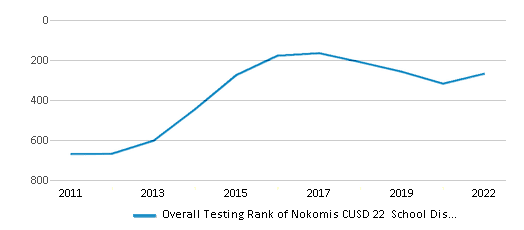
Math Test Scores (% Proficient)
(20-21)32%
28%
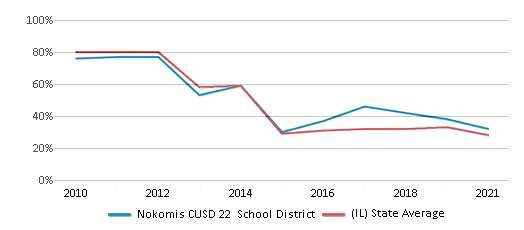
Reading/Language Arts Test Scores (% Proficient)
32%
30%
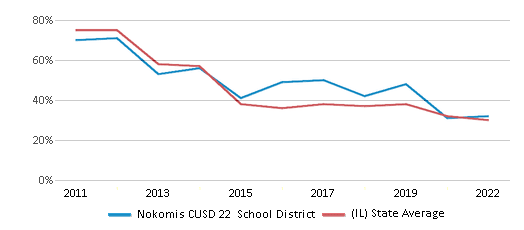
Science Test Scores (% Proficient)
50-54%
50%
Graduation Rate
≥90%
87%
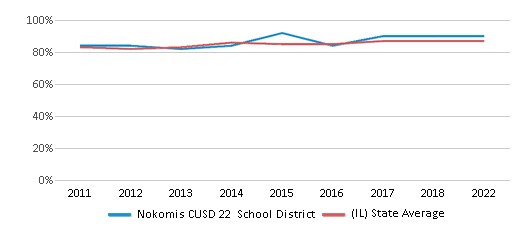
Students by Ethnicity:
Diversity Score
0.11
0.71
# American Indian Students
n/a
2,875 Students
% American Indian Students
n/a
1%
# Asian Students
n/a
66,874 Students
% Asian Students
n/a
6%
# Hispanic Students
18 Students
327,522 Students
% Hispanic Students
3%
27%
# Black Students
n/a
200,526 Students
% Black Students
n/a
17%
# White Students
554 Students
537,078 Students
% White Students
95%
44%
# Hawaiian Students
n/a
1,010 Students
% Hawaiian Students
n/a
n/a
# Two or more races Students
14 Students
52,605 Students
% of Two or more races Students
2%
5%
Students by Grade:
# Students in PK Grade:
59
55,955
# Students in K Grade:
38
116,411
# Students in 1st Grade:
34
126,375
# Students in 2nd Grade:
37
167,370
# Students in 3rd Grade:
37
130,315
# Students in 4th Grade:
35
130,334
# Students in 5th Grade:
42
129,913
# Students in 6th Grade:
35
132,181
# Students in 7th Grade:
39
113,007
# Students in 8th Grade:
48
113,824
# Students in 9th Grade:
57
2,377
# Students in 10th Grade:
44
2,138
# Students in 11th Grade:
45
1,882
# Students in 12th Grade:
36
1,813
# Ungraded Students:
-
12
District Revenue and Spending
The revenue/student of $18,846 in this school district is less than the state median of $21,990. The school district revenue/student has grown by 34% over four school years.
The school district's spending/student of $16,749 is less than the state median of $21,244. The school district spending/student has stayed relatively flat over four school years.
Total Revenue
$11 MM
$41,381 MM
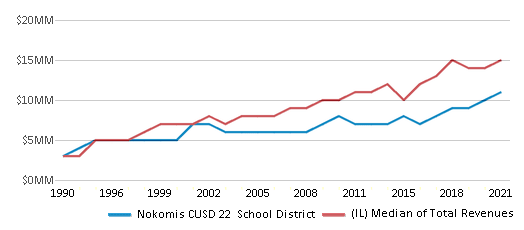
Spending
$10 MM
$39,976 MM
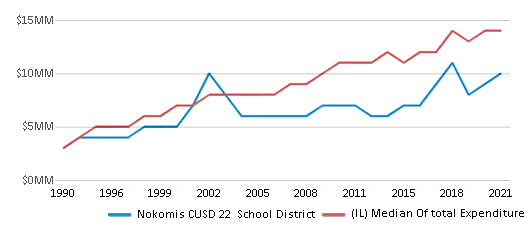
Revenue / Student (19-20)
$18,846
$21,990
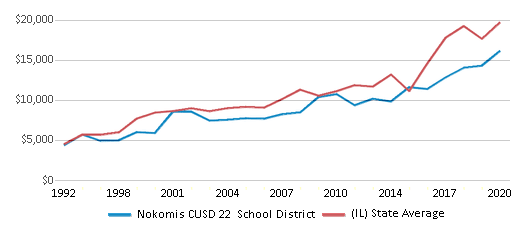
Spending / Student (19-20)
$16,749
$21,244

Best Nokomis CUSD 22 School District Public Elementary Schools (2025)
School
(Math and Reading Proficiency)
(Math and Reading Proficiency)
Location
Grades
Students
Rank: #11.
North Elementary School
Rank:
9/
Top 20%10
110 W Hamilton St
Nokomis, IL 62075
(217) 563-7311
Nokomis, IL 62075
(217) 563-7311
Grades: PK-5
| 282 students
Rank: #22.
Nokomis Jr/sr High School
Rank:
6/
Top 50%10
511 Oberle St
Nokomis, IL 62075
(217) 563-7311
Nokomis, IL 62075
(217) 563-7311
Grades: 6-12
| 304 students
Recent Articles

Year-Round Or Traditional Schedule?
Which is more appropriate for your child? A year-round attendance schedule or traditional schedule? We look at the pros and cons.

Why You Should Encourage Your Child to Join a Sports Team
Participating in team sports has a great many benefits for children, there is no doubt. In this article you will learn what those benefits are.

White Students are Now the Minority in U.S. Public Schools
Increasing birth rates among immigrant families from Asia and Central and South America, combined with lower birth rates among white families, means that for the first time in history, public school students in the United States are majority-minority. This shift in demographics poses difficulties for schools as they work to accommodate children of varying language abilities and socio-economic backgrounds.





